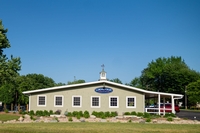The spotlight on Michigan wine has often been focused north, toward Traverse City. However, just as California has noteworthy wine beyond Napa and Sonoma, it’s important to recognize that Southwest Michigan has a serious wine scene that has been quietly earning its reputation. The region is known for refreshing and crisp whites and, increasingly, reds that can hold their own against European counterparts. Vineyards here, with their rolling topography, plentiful fresh water, rich soil diversity, and insulating lake-effect snow, are attracting ambitious young winemakers with an eye toward the future of American wine. Many of them are honing their skills on the campus of Lake Michigan College in Benton Harbor – the Midwest’s first commercial teaching winery. These winemakers are branching out into new territory, experimenting with varieties and techniques previously rare in Michigan.
Accordingly, the number of wineries in this region continues to grow. The expansion comes with ever-improving quality in red and white varietals, thanks to maturing vines and vintners having learned which grapes to plant, vineyard management, and winemaking techniques.
To learn about the past, present and future of the region’s winemaking, I turned to Jayme Neumann and Steve Salisbury. Jayme is the General Manager of Local Pour, an all-Michigan tasting room in Sawyer, MI, that showcases the best products from

small distillers, brewers, and winemakers throughout Michigan. She co-hosts “If Vines Could Talk,” a new podcast with Salisbury, who is dedicated to promoting the fine wines of Michigan, especially those of the Lake Michigan Shore American Viticultural Area (AVA) through “If Vines Could Talk,” which, beyond the podcast, offers wine reviews, historical information, and private tastings. Salisbury’s family grew grapes in the area in the late 1960s and 1970s, and he has held nearly every position in some of Southwest Michigan’s most heralded wineries.
Grape Juice, Prohibition, and Michigan Sweet Wines
Salisbury explained the history of Southwest Michigan wine, which began in 1868 with Joseph Sterling, who had studied winemaking in Europe and established the

Point Aux Peaux wine company in Monroe. Although Monroe was home to the first commercial winery in the state, grapes started to be grown throughout Michigan to meet the growing demands of the juice and wine industries.
Numerous vineyards planted the native Concord grape, and this caught the attention of Dr. Thomas Bramwell Welch and his son. The Welch family pasteurized the juice from Concord grapes and marketed it as an alternative to fermented wine for church services. Like so many other states, the enactment of Prohibition in 1919 put a damper on wine production and the expansion of wineries in Michigan. However, wineries that supplied Welch’s processing plants were able to stay in business. Notably, Michigan was the first state to repeal Prohibition. When the wine industry returned in the mid-20th century, most wineries produced sweet and fruit wines. This was the stayed course until the 1970s when Tabor Hill Winery opened.
Tabor Hill Winery and the Evolution of SW Michigan Wine
Leonard Olson founded Tabor Hill Winery in Buchanan, Michigan. It was the first winery specializing in vinifera grape wines, such as Cabernet Franc, Merlot, Syrah, and Chardonnay. They had so much success that wine from Tabor Hill was served in the White House at a State dinner honoring Austrian Chancellor Bruno Kreisky on Nov. 12, 1974. It was the first Wolverine State wine ever served at a White House state dinner. Moving forward, there was slow growth in the number of wineries in the state, and experimentation with different varieties continued well into the 2000s.
Southwest Michigan’s New Winemaking Identity
Southwest Michigan’s wine region has seen a remarkable transformation in recent years. From growing rarely-seen grape varietals thought to be impossible to grow in Michigan to showing customers one-by-one that great wine can be produced in the region, the region’s winemakers are determined to place Southwest Michigan wine on the world stage.
This is all thanks in part to a cadre of visionary winemakers. The relocation of talented winemakers from Napa, Bordeaux, and the Willamette Valley, coupled with

the presence of long-lauded local vintners, has added to the region’s luster. The maverick winemakers reshaping the narrative around the region, as identified by Salisbury and Neumann, include veterans like Jim Lester (Wyncroft), Dave Miller (White Pine Winery), Nancie Oxley (St. Julien), Joe Herman (Karma Vista Vineyard), Michael Moyer (Director of Viticulture at Lake Michigan College) and Jeff Lemon (Lemon Creek Winery) and then rising stars like Andrew Backlin (Modales) Amy Birk (Domaine Berrien Cellars), Maxx Eichberg (Stranger Wine Company) and Rudy Shafer (Dablon Vineyards). Through their dedication to quality and not commercialization, they are changing the perception of Michigan wine, elevating it, and garnering recognition in international and national competitions. These awards underscore the consistent quality of wines produced here and that the future of Michigan wine holds endless promise.
What’s Next?
To help SW Michigan’s wine industry grow, consumers must visit and start exploring. The area is a mere few hours from major Midwest cities like Chicago and Detroit. Whether you are a seasoned oenophile or a curious novice, a visit to Southwest Michigan promises a delightful experience.
The next step? Tasting and forming your own opinion. Perceptions can be difficult to change in the wine world, but that will not stop Neumann and Salisbury, who are “changing opinions one sip at a time.”
To help get you started on your exploration of the region’s fine wines, below are a few recommendations from Neumann and Salisbury focused on the varieties they feel best reflect the quality that Southwest Michigan has to offer.
Cabernet Franc - Seek Out: White Pine Winery
Sauvignon Blanc – Seek Out: Karma Vista Vineyard
Pinot Noir Rosé - Seek Out: Stranger Wine Company
Sparkling/Blanc de Blanc – Seek Out: Dablon Vineyards
Brut Rosé – Seek Out: Tabor Hill Winery